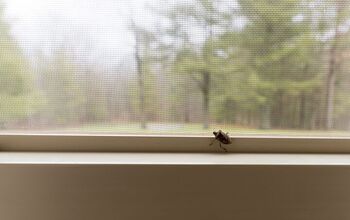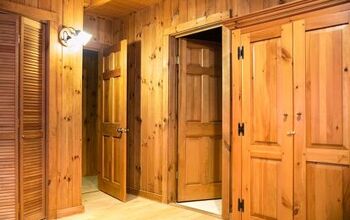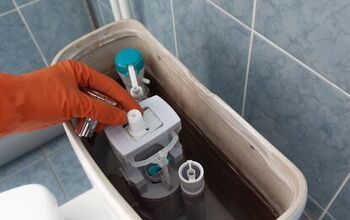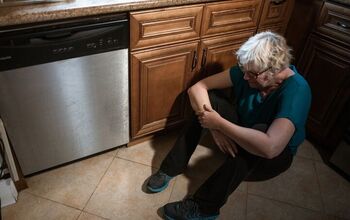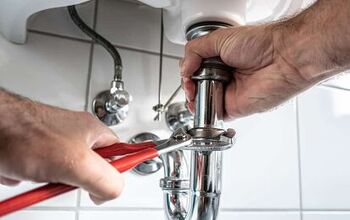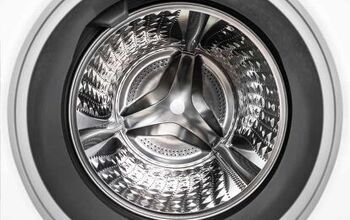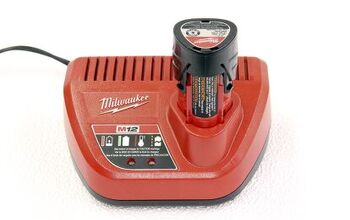Why Are There Spiders In My House During The Winter?

The sight of a spider in your house is scary no matter what time of year it is. However, the last thing you want is to discover a spider when you’re warm and cozy inside on a winter day. So, why are there spiders in my house during the winter?
You are likely to find spiders in your house during the winter if the humidity level exceeds 50%-60%. Spiders also invade houses with pest problems as they hunt insects like mosquitoes and flies. Seal the gaps at the bottom of your doors and patch your siding and windows to keep spiders out of your home during the winter.
Exercise caution when you bring outdoor furniture inside for the winter. Spiders may hitch a ride on lawn chairs and seat cushions if you don’t remove webs. Follow along as we explore why there are spiders in your house during the winter and highlight solutions.
Why Am I Getting Spiders In The Winter?
Spiders get into people’s houses during the winter looking for shelter, water, and food. It’s the same reason that other bugs, like flies, mosquitoes, and wasps often come inside during the fall and winter. Spiders often follow their prey, such as flies, into houses when the temperature drops.
They also seek water as water sources often dwindle and even freeze throughout the winter. Warm, humid houses with lots of clutter especially attract some spiders, like brown recluses. The spiders you find in the winter may have even come inside during the fall and have been hiding since.
How Do Spiders Get In The House?
1. Door Gaps
Door gaps are the easiest points of entry for many pests during the winter, including spiders. Spiders are likely to notice the large gap beneath your door and take advantage of it when they get cold. They often crawl through door gaps in search of prey, water, and warmth.
This is solvable as you can cheaply install weatherstripping as part of your end-of-summer checklist. Doing so will close the gap, making it much harder for most spiders to squeeze through. It also comes in handy when it comes to lowering your electric bills.
Weatherstripping helps your home retain warm air and keep cool air out during the winter. This also helps block outdoor sounds from polluting your comfort zone at home, and that’s priceless.
2. Existing Pest Problem
An existing pest problem can unfortunately cause spiders to enter your home. The flies, gnats, and mosquitoes in your home may seem annoying, but the problem can get worse. Spiders naturally target such pests, even if they are in your home.
That’s why you must be proactive with pest control solutions. Before hiring an exterminator, it’s worth sealing your door gaps and cracks and using essential oils to repel spiders. Essential oils like lavender, peppermint, clove, and thyme help keep spiders away.
Scatter such essential oils around the perimeter of your home and in front of doors. However, you must be careful if you have pets as some oils, like peppermint, can harm animals. Otherwise, it’s worth hiring a pest control company to treat your home and setting out glue traps to catch spiders.
3. Items From Outside
Fall and winter is when many homeowners bring some outdoor items into the house. This includes everything from outdoor furniture and potted plants to barbecue supplies. Sneaky spiders can latch onto or hide within many outdoor items.
This makes it all too easy to unknowingly bring spiders into your house before and during the winter. You can minimize the risk of this happening if you inspect and shake outdoor items before you bring them inside. Be thorough and even shine a light into crevices to check for spiders.
That’s especially true when you bring outdoor furniture inside at the end of the summer. Remove and shake each cushion until you’re sure there are no spiders. It’s also worth checking beneath the chairs, as spiders often hide in webs below outdoor furniture.
4. Damaged Siding
A house’s siding takes a beating over the years, mostly due to the elements. This often leads to damage, cracks, and gaps that make it easy for spiders to get in your house. Spiders often notice such gaps in times like winter when their food, water, and sources of warmth dwindle.
Vinyl siding typically develops cracks and gaps sooner than fiber cement or wood siding. That’s why it’s important to inspect your siding 1-2 times per year, no matter what material it is. You can patch holes in siding with expanding foam, but that’s mostly effective for vinyl siding.
Otherwise, you may need to replace the siding panel altogether if the cracks and gaps are too large. Damaged siding can make your home cooler, which increases energy bills. Routine siding inspections and maintenance can keep spiders out during the winter and make your home comfortable.
5. Excessive Moisture
Spiders are drawn to dark, moist environments, as they are conducive to hunting prey. The higher the humidity level in your home, the more likely you are to find spiders inside. That’s especially true if the humidity level reaches 60%.
This is a common problem in humid climates and in homes with lots of houseplants. You can help keep spiders out of your house during the winter if you maintain a 40% humidity level. However, anywhere between 30% and 50% humidity can help minimize your home’s spider population.
The easiest way to fix your humidity level during the winter is to install a whole-house dehumidifier. You can maintain a healthy humidity level if you run it for 8-12 hours per day. Otherwise, you can run a small dehumidifier in specific rooms that are overly humid.
6. Your Location
Unfortunately, the location of your home has a lot to do with how often you find spiders there. For example, heavily wooded areas are naturally common nesting and hunting areas for spiders. Homes that are backed up against trees are likely to suffer spider infestations.
You are also likely to find spiders in your home if you live in an area with frequent construction and deforestation. Spiders seek shelter in homes during the winter when they lose their natural habitats. Many homeowners are unlikely to move because of spiders, so being proactive is essential.
Spray the perimeter of your home for spiders every 3 months if you consistently have a problem with spiders. Many chemicals are only effective for 60 to 90 days, so reapplication is necessary.
Should I Be Worried About Spiders In My House?
The only spiders in your home worth getting very worried about are brown recluses and black widows. They are the only spiders in the United States that are venomous to humans. Unfortunately, black widow spiders appear in most U.S. states.
You can find brown recluse spiders in 16 states, such as Illinois, Missouri, Mississippi, Texas, Louisiana, and Ohio. Brown recluses and black widows are similar in that they both like to hide in dark, cluttered spaces. It’s essential to declutter your home if you live in an area where black widows and brown recluses are active.
Children are especially at risk of venomous spider bites. That said, adults should also be concerned and consult a medical professional upon discovering a venomous spider bite. The bites can become necrotic in some cases, and necrotic wounds require medical attention.
Summing It Up
Spiders stay in houses during the winter because they need food, water, shelter, and warmth. You are likely to find spiders in your home if your doors and windows have cracks and gaps. Spiders are also drawn to humid homes with other pests that spiders eat, such as flies and mosquitoes.
Related Guides:

Nick Durante is a professional writer with a primary focus on home improvement. When he is not writing about home improvement or taking on projects around the house, he likes to read and create art. He is always looking towards the newest trends in home improvement.
More by Nick Durante










